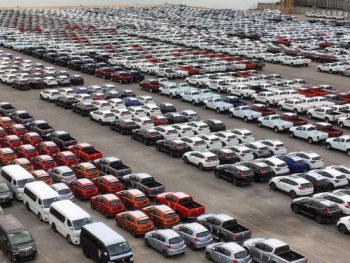Proposed plans by US president-elect Donald Trump to impose massive tariffs on imports could have a direct impact on the UK fleet market, the Association of Fleet Professionals (AFP) has warned.

During Trump’s election campaign, he variously promised that tariffs of 100% or 200% would be imposed on all vehicles imported into the US, as well as 60% on all Chinese goods, which would directly affect electric vehicles made in China.
With automakers now bracing themselves to see if any of these moves are enacted, Paul Hollick, AFP chair, has warned of dramatic challenges on the global car and van market, especially for EVs.
“There seems to be some confusion whether these tariffs are actual plans by the Trump administration or some kind of gambit to negotiate more advantageous trade deals. However, tariffs at this kind of level would effectively make imported cars unsaleable in the US and, of course, there have also been, sometimes substantial, tariffs recently imposed in the EU.”
While carmakers are assessing whether production can move to the US, this will not happen overnight.
And Hollick has spotlighted that all vehicle production aimed at the US – especially large numbers of Chinese EVs – would inevitably make its way towards freer global markets, the UK being one, with significant impacts.
“So far, the actions of new Chinese entrants have been quite measured but there will be a huge temptation to dump large numbers of cars and vans here at low prices, causing high levels of disruption.”
Amid an uncertain outlook, the AFP said predicting the outcomes was difficult.
“At the extremes, our government might decide that domestic manufacturers need similar protection and introduce tariffs of its own, step back and let the market find its level, or any of a hundred points in-between. The future view looks quite murky.”
But if Trump does push ahead with tariffs, this would put UK fleets in a difficult position, Hollick explained, with a domestic market that was tricky to read, and vehicle buying decisions that could be hugely risky.
“On one hand, having access to a supply of cheap Chinese EVs would arguably be good for fleets in their transition to net zero, and also provide a boost to the retail EV market. However, this is likely to come at the risk of stability and a volatile market is ultimately a bad one where, for example, forecasting accurate residual values becomes very difficult.”
Fleets would be watching Trump’s statements carefully over the next few weeks, Hollick added.
“The sooner there is some clarity around the situation, the better. It is not a political point to say that what the president elect says and what he does are quite often two different things but it seems likely that, given the extent to which he has spoken about tariffs during his campaign, this is not an issue that is going to go away.”
Last week saw the National Institute of Economic and Social Research say Britain “would be one of the countries most affected” by the proposed tariffs, with growth cut by 0.7 percentage points in year one, 0.5 percentage points in year two, and inflation 3-4 points higher.
He added: “The truth is that tariffs imposed by a major western economy of the scale being promised are almost unknown in modern times and it is difficult, if not impossible, to forecast the impact. However, it’s also true that some economists are making quite dire predictions. We await the outcome with some trepidation.”

